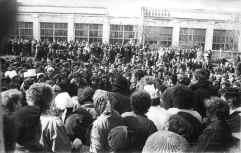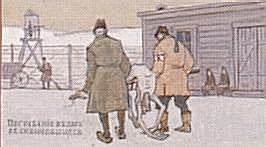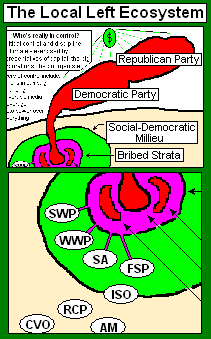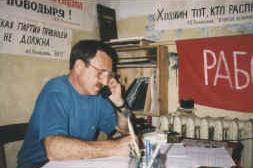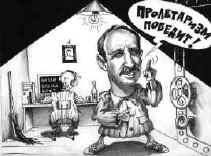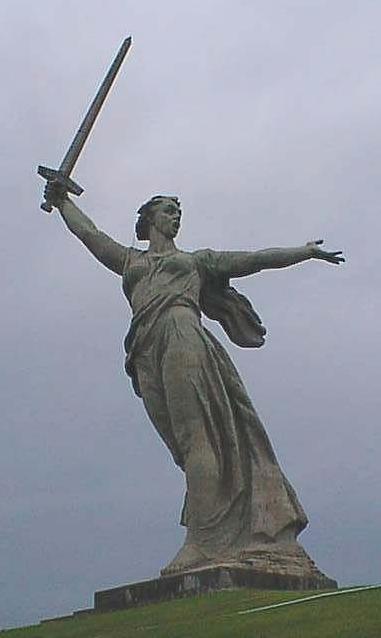|
Last updated: December 26, 2004
for the 21st century |
At that time, Lenin argued that the name "social-democracy" had been hopelessly and permanently compromised -- and should be abandoned
led to the rule of a new exploiting class
The degeneration of the Soviet Revolution took place in such a way that
great unclarity
was created concerning what had happened and why.
At the time of Lenin's incapacitation in 1922-23,
the Civil War and imperialist intervention (1918-1920) had shattered
the Soviet economy -- famine was widespread -- and martial law prevailed.
A series of painful emergency measures had been taken which included:
In order for the working class to effectively rule society
as a class
it needs to have a political life which is independent from the ruling state.
In practice this means that the workers need the
fundamental democratic rights of speech and independent organization.
More than this, the rule of society by the working class requires a clear distinction in principle between: These necessary conditions for the class rule of the workers could not be met in the extreme conditions of early 1920's Soviet Russia without setting in motion a train of event which would have quickly led to the restoration of bourgeois rule. With a functioning economy, running factories and electricity it would have been possible for the Soviet revolution to lessen the intense dissatisfaction of the peasantry and create conditions for the rule of society by the working class. But these things would take 10 or 20 years to achieve. And this much time did not exist. Under the considerable pressure which existed the ruling party/state degenerated (probably in the late 1920's). Without workers having the right to organize independently -- there was no powerful and effective force to oppose the degeneration of the ruling party/state -- and a new exploiting class emerged which ruled over the workers like feudal lords over serfs. The suffocation of the Soviet revolution resulted in a crisis of theory which has persisted for many decades as working class activists in all countries have struggled to confront the nature of working class rule in the modern world.
the revolutionary workers' movement
Innumerable social-democratic (ie: reformist) trends have taken advantage of this degeneration to urge activists to give up on the idea of fundamental change -- and to instead enter into demoralizing alliances with liberal institutions or with a corrupt, bourgeois-controlled strata of trade union bureaucrats, religious leaders, poverty pimps and progressive media personalities. Also popular has been an assortment of third world nationalist political trends in which activists pin their hopes on various third world dictators who have come into conflict with western imperialism. Many revolutionary (or would-be revolutionary) trends have also attempted to confront the crisis created by the suffocation of the October revolution. Many Trotskyist trends emerged in the late 1920's to offer their alternative to Stalinism. The 1960's witnessed the emergence of the Albanian-Maoist critique of Krushevite revisionism. And all along a number of anarchist or left syndicalist trends have argued that everything would have been fine if only the Bolsheviks had not suppressed their enemies. Many of these trends still exist today, often doing useful revolutionary work -- but also often falling into the reformist swamp or isolating themselves as sectarian cults (or both). None of these trends have created the solid theoretical basis (ie: breaking from the root of problem: the merger of the party/state and lack of workers' democratic rights of speech and organization) that would overcome the crisis of theory and allow the revolutionary movement to unite around the clear goal of the rule of the working class, as a class, in the context of modern conditions. And few of these trends have understood the immense potential of the emerging revolution in communications which will allow revolutionary activists to create electronic news services (and other mass channels) that could effectively leverage the contributions, comments, questions and criticisms of hundreds of thousands of activists. Many of these trends are unable to make effective use of elists and web-based forums because their bankruptcy on the theoretical front has left them unable to answer simple questions or reply to criticisms (ie: these trends are afraid of political transparency).
with the treachery of the past
Many key events in the last few years (the collapse of Soviet revisionism, the emergence of email and the web, the politicization of hundreds of thousands as a result of US imperialism's latest adventures in the Middle East) are creating conditions for the re-emergence of a revolutionary mass movement that commands the respect of serious militant activists everywhere and is deserving of the attention and loyalty of the working class.
The proposal from the workers' movement in Russia, where the revolution was first and most decisively betrayed, for a new name for the revolutionary workers' movement appears to me to be consistent with the demands of our time. The term "proletarism" helps to emphasize that the goal of the revolutionary workers' movement is the rule of society by the working class as a class -- rather than the rule of an organization which claims to represent the interests of the workers. Only this can lead to the transition to the ultimate goal of a classless society with no state whatsoever.
|
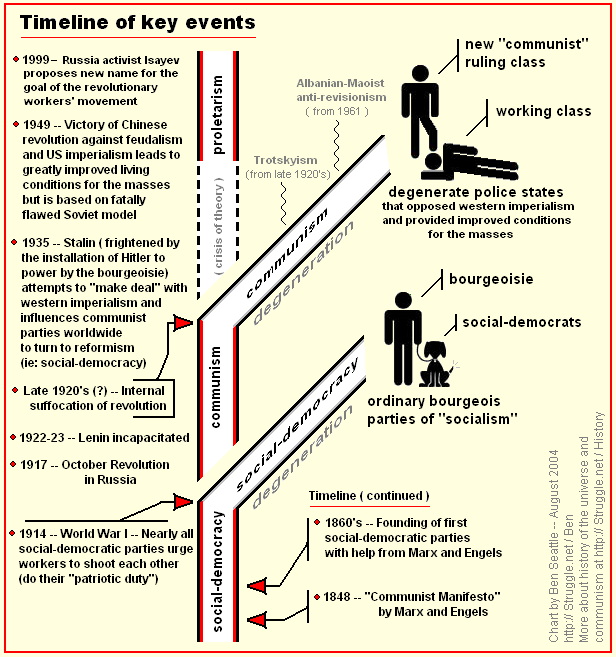
|
Discuss this article on the POF-200 email list
More about See also: A. B. Razlatsky and "The Second Communist Manifesto" (below)
Gregory Isayev's organization: Ben Seattle has discussed the Proletarism proposal on the POF-200 list on: June 7, June 13, June 20 and July 20 Related theoretical material can be found at the Anarcho-Leninist Debate on the State including the articles: • The World for which We Fight, • Finding the Confidence to Build the Future, • The Future Transparent Workers' State and • Politics, Economics and the Mass Media when the working class runs the show Ben Seattle's website More about the History of the Universe and Communism
|
|
|
In the 1970's a Russian intellectual, A. B. Razlatsky, influenced perhaps by the cultural revolution in China (as were many at the time) concluded that the "dictatorship of the proletariat" that supposedly existed in his country was a fiction disguising the rule of a parasitic strata that was exploiting the working class and suppressing its revolutionary energies. Razlatsky responded by creating an underground communist organization that aimed to restore a genuine proletarian dictatorship to the then Soviet Union. Razlatsky's underground group organized workers for strikes and similar work stoppages in defense of their basic rights. The authorities eventually discovered the existence of this group and in December 1981 Razlatsky and one of his collaborators, Grigorii Isaev, were arrested and sent to the Gulag. Eventually, under Gorbachev, they were released. Razlatsky died in 1989. Isaev went on to lead a very militant strike (in 1997?) of five thousand workers (which included a factory occupation and the months' long blockage of the main avenue in Samara, a city of 1.5 million). Isaev was arrested twice in the course of this struggle and each time released under international pressure. Razlatsky's theoretical work includes "The Second Communist Manifesto" (1979), "Notes in the Margins of History" (1989) and many other works. He is most well known for two theses: The political economy of the Soviet Union had more similarities to feudalism than either capitalism or socialism. In a genuine dictatorship of the proletariat the workers' party would be completely distinct from the state (so much so that party members would be required to resign from the party before taking a position within the workers' state). Grigorii Isaev has continued with Razlatsky's work, founding the Samara Stachkom (ie: strike committee) and the Party of the Proletarian Dictatorship (PDP). On the theoretical front, Isaev has advanced the thesis that the term communism should be abandoned as the name of the movement aimed at the overthrow of bourgeois rule--and replaced by the term "proletarism". The precedent for this is Lenin's advocacy, following the great betrayal of 1914, that the term "social democracy" be abandoned in favor of the term "communism". The revisionist betrayal of Lenin's 1917 revolution by a corrupt strata of self-serving feudal lords, argues Isaev, is fully comparable to the 1914 betrayal by the workers' parties which abandoned the interests of the working class and sided with their own bourgeois rulers at the outbreak of the first world war. (from "proletarism" section of Proletarian Democracy, by Ben Seattle) |
